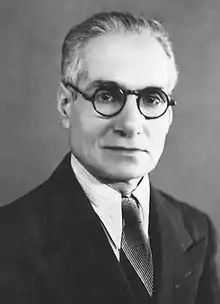| Author | Ahmad Kasravi |
|---|---|
| Audio read by | Qasim Qaradaghi |
| Country | Iran |
| Language | Persian |
| Series | Read and judge |
| Genre | Nonfiction, Religious criticism |
| Published | 1943 |
| ISBN | 9780939214396 |
| Preceded by | Baháʼísm |
| Followed by | varjavand bonyad |
| From article series about: |
| Ahmad Kasravi |
|---|
 |
| Works |
|
| Related Topics |
|
Shiʿism (Persian: شیعهگری, romanized: Šiʿigari) or Read and judge (Persian: بخوانند و داوری کنند, romanized: Beḵᵛānand o dāvari konand) is a book written by Ahmad Kasravi that deals with criticisms of Shia Islam. Shiʿism is one of Kasravi's three books criticizing what he calls a bad religion. The book caused a great deal of controversy during Kasravi's lifetime, and even led him to court; But before the legal process could be completed and the verdict was issued, several members of the Fadaiyan-e-Islam, with the fatwa and support of Ruhollah Khomeini and led by Navvab Safavi, stabbed Kasravi to death in court.[1] Shiʿism in his time was one of the first books to deal with the critique of Shia Islam, and following this book, many authors criticized religion in Iran.[2] Kasravi was one of the first thinkers and writers to express views on Shiʿism that are still debated.
contents
Kasravi has written his views based on sources from the period when first Alids movement was formed.[3]
Kasravi considered the emergence of Shiʿism during the time of the Umayyad caliphs and considered the first contamination of the Shiite faith as their extremist slander of Abu Bakr, Omar and Uthman due to superiority over Ali in the caliphate.[4] According to him, Ja'far al-Sadiq, the sixth Imam of Shias, was the first to coin the word Imam, and in order to obtain "khums" and "property of the Imam".[5] Karvi considers the statement of the Shiite Imams that "no one knows the meaning of the Qur'an except us and whoever does not know should ask us" and "whoever does not know the Imam of his time has died without knowing it" as "extra and ridiculous words". ; And he considers narrator (Imams) as abusive.[6] He challenged the belief in the Twelve Imams and believed that the branch had done nothing but "spread blackmail and laziness and sponging."[7]
Kasravi also considers the system of Imamate to be a rotten dictatorship "which is not mentioned anywhere in the Qur'an."[8] Kasravi also criticizes Shiite prejudice, saying that "mullahs who have learned Islamic science, for example, are not as prejudiced against this religion as these fanatics."[9]
Publication
Kasravi published Shiʿism in February 1944. Following this, the clerics and fanatics of the Muslim people, as well as the religious leaders of the country, protested against its contents and filed a lawsuit against him in court, banning the distribution of the book. Kasravi did not give up and four months later, in order to justify his views in front of the people, he published the above book with more explanations and left it to the people to judge.[10]
The audio book Shiʿism was recorded with the voice of Qasim Qaradaghi, and was published in 2015 by Avae Bof Publications, which lasts 5 hours and 40 minutes.[11]
References
- ↑ KASRAVI, AḤMAD ii. ASSASSINATION A few weeks after the failed assassination attempt, Sayyed Ruḥ-Allāh Musawi al-Ḥosayni (later Ayatollah and Imam Khomeini) demanded that young martyrs for Islam respond to “this illiterate Tabrizi,” a reference to Kasravi’s birthplace (Emām Ḵomeyni, I, p. 21).
- ↑ Rasol Jaefarian, Religious-political currents from 1320 to 1357, p. 68-69, 2011
- ↑ Kia, Chad (2014-10-02). "The Scum of Tabriz: Ahmad Kasravi and the Impulse to Reform Islam". British Journal of Middle Eastern Studies. 41 (4): 498–516. doi:10.1080/13530194.2014.932270. ISSN 1353-0194.
- ↑ Kasravi, p. 8
- ↑ Kasravi, p. 9
- ↑ Kasravi, p. 10
- ↑ Kasravi, p. 94-99
- ↑ Kasravi, p.18
- ↑ Kasravi, p.21
- ↑ Kia, Chad (2014-10-02). "The Scum of Tabriz: Ahmad Kasravi and the Impulse to Reform Islam". British Journal of Middle Eastern Studies. 41 (4): 498–516. doi:10.1080/13530194.2014.932270. ISSN 1353-0194.
- ↑ "Søg, find og lån fra alle Danmarks biblioteker". BIBLIOTEK.DK (in Danish). Retrieved 2020-12-19.